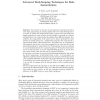1194 search results - page 226 / 239 » A Language for Implementing Arbitrary Logics |
AGENTS
2001
Springer
14 years 1 months ago
2001
Springer
Agents are intended to interact in open systems where the knowledge about others (reputation) is incomplete and uncertain. Also, this knowledge about other agents is subjective si...
AGP
2003
IEEE
14 years 20 days ago
2003
IEEE
Abstract. The interest in the area of non-monotonic reasoning and declarative logic programming is growing rapidly after the recent development of a number of Answer Set Programmin...
TLDI
2010
ACM
13 years 9 months ago
2010
ACM
Interactive programs, such as GUIs or spreadsheets, often maintain dependency information over dynamically-created networks of objects. That is, each imperative object tracks not ...
SAC
2006
ACM
13 years 9 months ago
2006
ACM
Interactive configuration guides a user searching through a large combinatorial space of solutions to a system of constraints. We investigate a class of very expressive underlying...
INFORMS
1998
13 years 8 months ago
1998
High-level formalisms such as stochastic Petri nets can be used to model complex systems. Analysis of logical and numerical properties of these models often requires the generatio...

